Testcontainers
A Year (or more) in Review


-
Doctoral Researcher @ Institute for Internet Security
- Blockchain Research Group Lead
- Consultant @ Styrascosoft GbR
- Testcontainers Maintainer and Open Source Enthusiast
- Oracle Groundbreaker Ambassador
- GitKraken Ambassador
- Organizer Software Crafting Meetup Ruhr
Kevin Wittek @kiview


Thanks to Sergei!
(for slides and everything else)
@bsideup

Why do we Test?
Because else we might end up here!

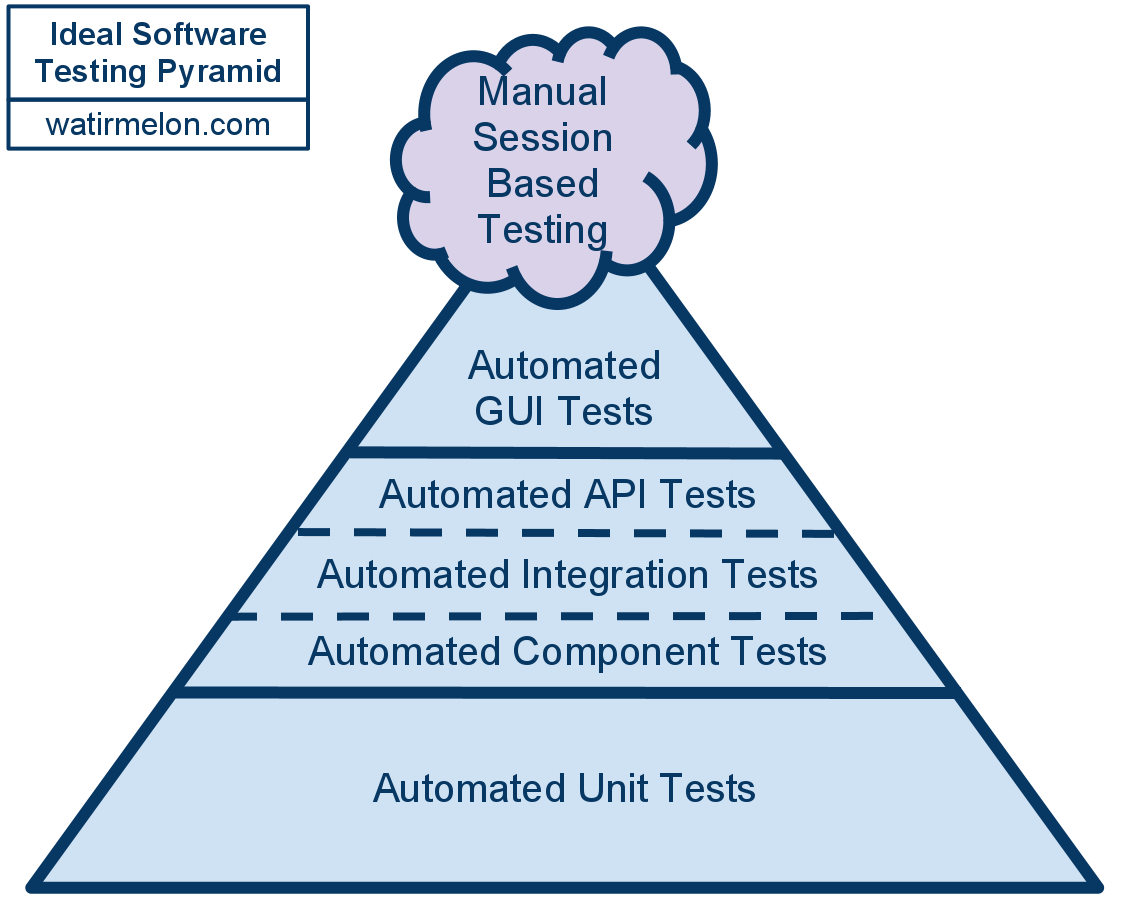
My definiton
For example:
- Launch application server
- Framework/Library interactions
- Interact with external ports (e.g. network, file system, database)
"Tests which interact with external systems/dependencies"
But why a pyramid?
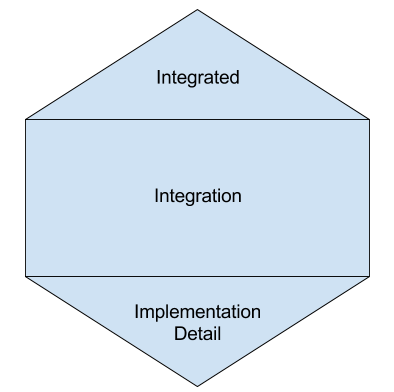
Testing Honeycomb
Integrated Tests
"I use the term integrated test to mean any test whose result (pass or fail) depends on the correctness of the implementation of more than one piece of non-trivial behavior." - J.B. Rainsberger
"A test that will pass or fail based on the correctness of another system." - Spotify
Integrated Tests
For example:
- We (manually) spin up other services in a local testing environment
- We test against other services in a shared testing environment
- Changes to your system breaks tests for other systems
Integration Testing Transformation

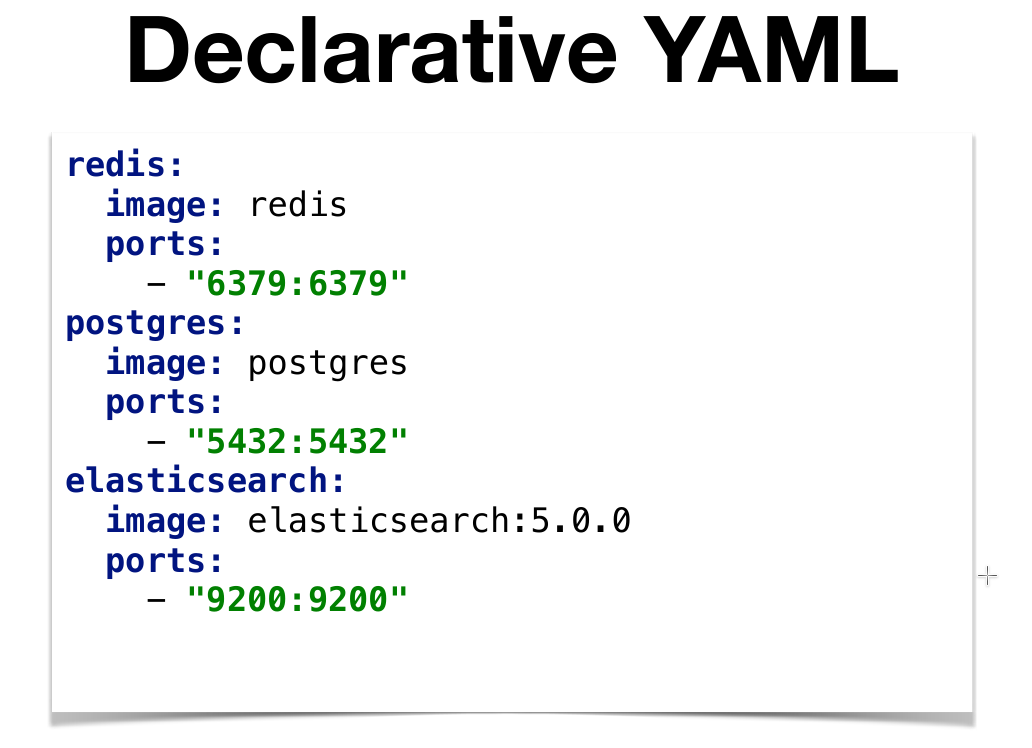
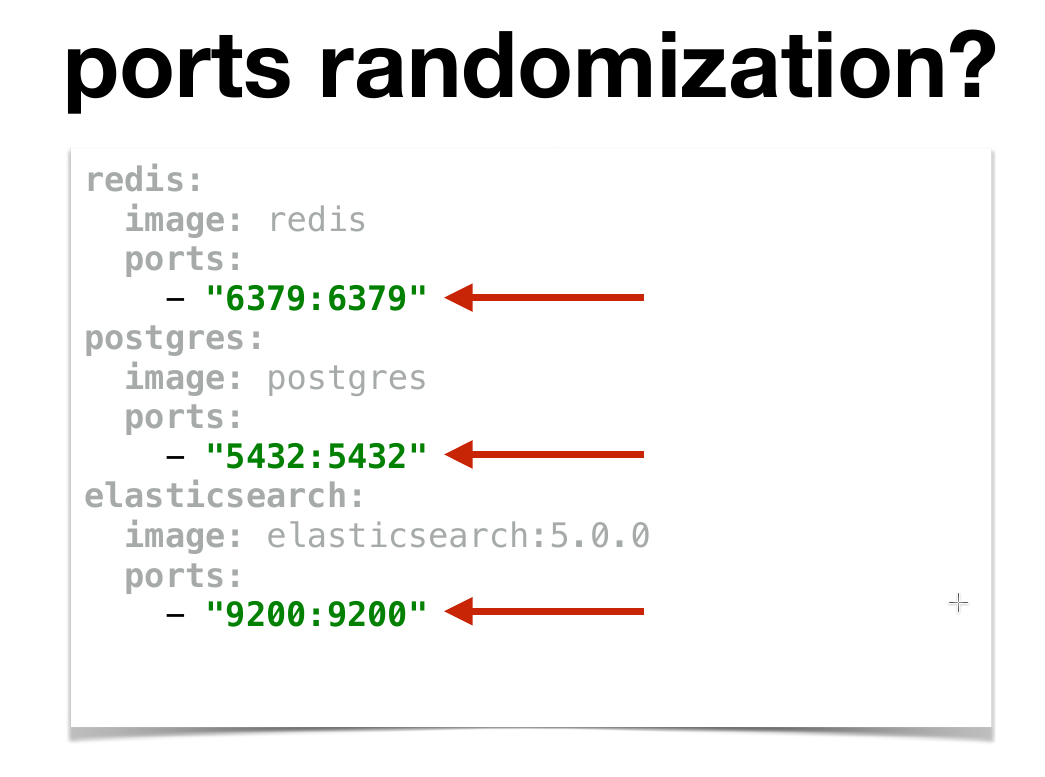
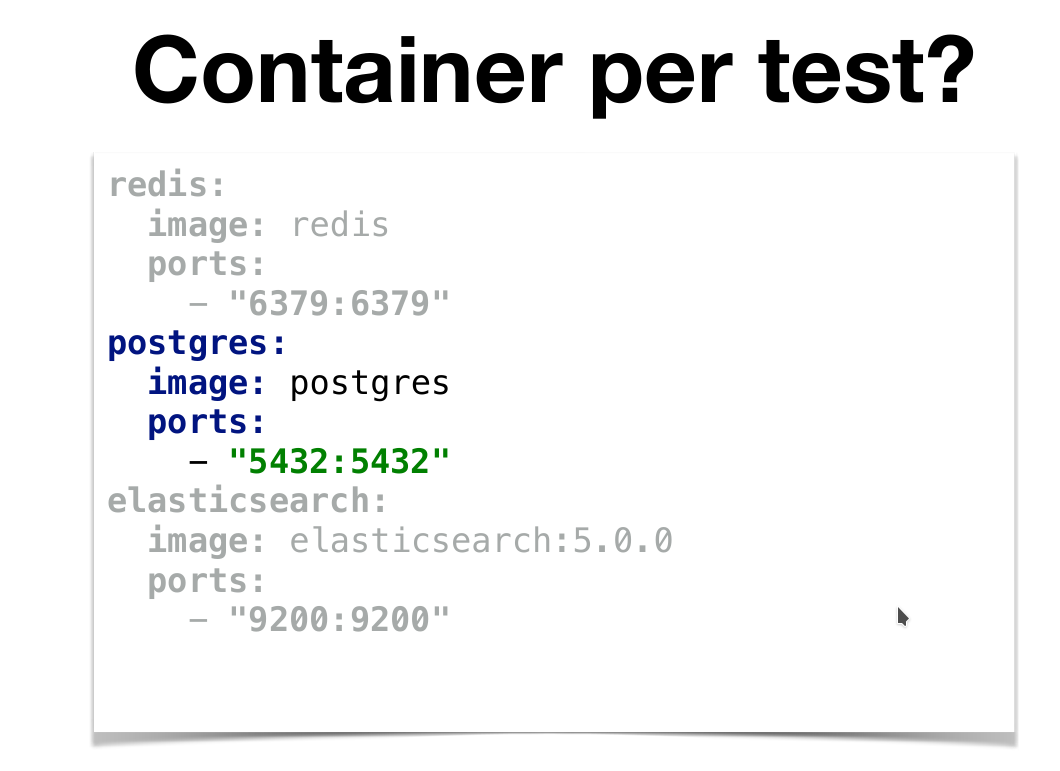
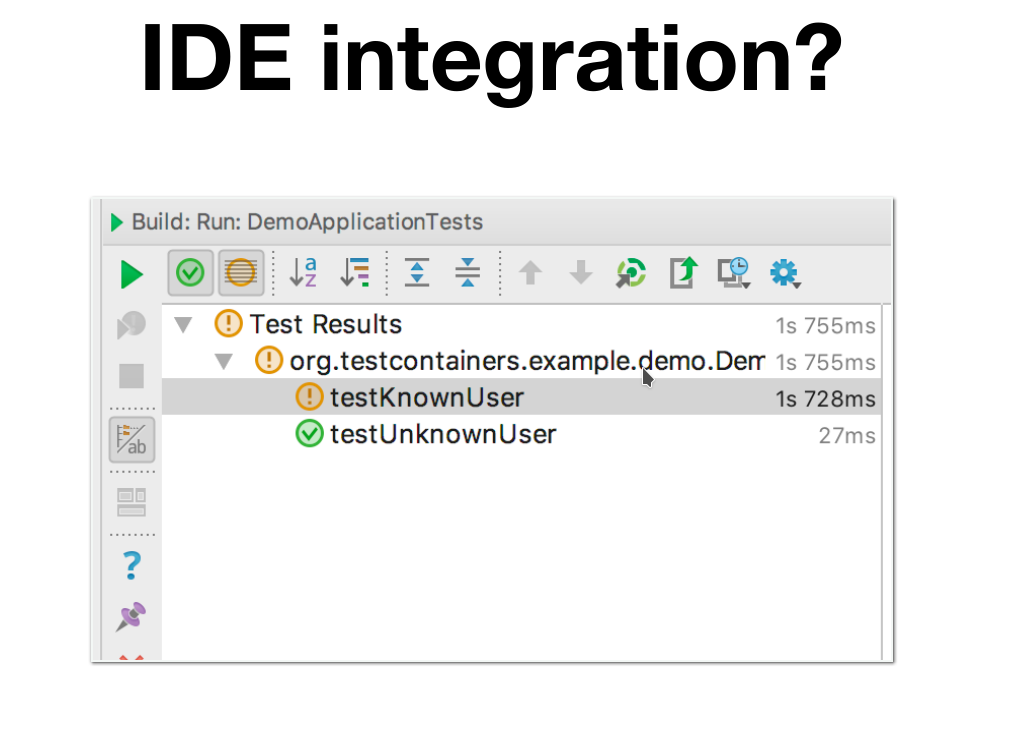


GenericContainer redis =
new GenericContainer("redis:3.0.2")
.withExposedPorts(6379);
redis.start();
// test my stuff
redis.stop();The Project
- testcontainers-java first released in 2015
- 100% OSS, MIT licensed
- 65 releases, 149 contributors
- Core maintainers
- Richard North
- Sergei Egorov
- Kevin Wittek
- Forks in Python, C#, Rust, Go, JS; Scala wrapper

@whichrich

Capabilities
- Generic docker container support
- use any Docker image to support tests
- Databases (many!) and Stream processing (Kafka, Pulsar)
- AWS mocks (Localstack)
- Docker Compose
- Selenium
- Chaos testing
Capabilities (2)
- Dynamic port binding and API
- WaitStrategies
- Docker environment discovery (e.g. docker-machine, DOCKER_HOST, Docker for Mac, Docker for Windows)
- Platform independent
- Linux, macOS, Windows 10 (with NPIPE support!)

@ashleymcnamara
Works on Windows too!
JDK13 Compatible!
+ regularly build against openjdk-ea
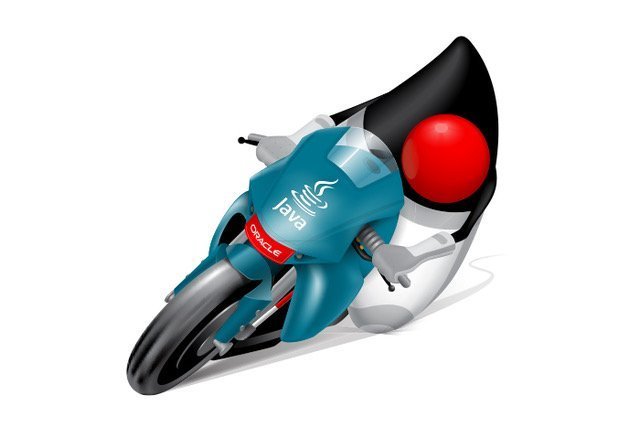
Users

Spock Extension
@Testcontainers
class TestContainersClassIT extends Specification {
@Shared
GenericContainer genericContainer =
new GenericContainer("postgres:latest")
.withExposedPorts(5432)
.withEnv([
POSTGRES_USER: "foo"
POSTGRES_PASSWORD: "secret"
])
}// Set up a redis container
@ClassRule
public static GenericContainer redis =
new GenericContainer("redis:3.0.2")
.withExposedPorts(6379);JUnit4 Rules
Testcontainers-Jupiter (JUnit5)
@Testcontainers
class SomeTest {
@Container
private MySQLContainer mySQLContainer = new MySQLContainer();
@Test
void someTestMethod() {
String url = mySQLContainer.getJdbcUrl();
// create a connection and run test as normal
}
}

What happened so far...
Jan, 2018 (1.6.x)
- Kafka module
- "Ryuk" sidecar

@Test
public void testUsage() throws Exception {
try (KafkaContainer kafka = new KafkaContainer()) {
kafka.start();
testKafkaFunctionality(kafka.getBootstrapServers());
}
}Apr, 2018 (1.7.x)
- Maven BOM
- DockerCompose wait Strategies
- MockServer module
<dependencyManagement>
<dependencies>
<dependency>
<groupId>org.testcontainers</groupId>
<artifactId>testcontainers-bom</artifactId>
<version>{{latest_version}}</version>
<type>pom</type>
<scope>import</scope>
</dependency>
</dependencies>
</dependencyManagement>new DockerComposeContainer(new File("src/test/resources/compose-test.yml"))
.withExposedService("redis_1", REDIS_PORT, Wait.forListeningPort())
.withExposedService("db_1", 3306, Wait.forLogMessage(".*ready for connections.*\\s", 1))
.withTailChildContainers(true);Jun, 2018 (1.8.x)
- OkHttp transport
- Test framework agnostic (Startable interface)
- Docker cred. helpers
- copyFileToContainer
- New modules!
- Pulsar
- Couchbase
- Cassandra
GenericContainer container = new GenericContainer()
.withCommand("sleep", "3000")
.withCopyFileToContainer(
MountableFile.forClasspathResource(
"/mappable-resource/"),
containerPath);Sep, 2018 (1.9.x)
- OkHttp by default
- Windows npipe support
- Registry auth support on Windows
- Fix local compose on Windows
- Host ports exposing


Testcontainers.exposeHostPorts(localServerPort);
final String rootUrl =
String.format("http://host.testcontainers.internal:%d/", localServerPort);Sep, 2018 (1.9.x)
- Dynamic port binding in Couchbase module
- New modules
- ClickHouse
- PostGIS
Nov, 2018 (1.10.x)
- JUnit5 (Jupiter) support
- Documentation relaunch
- Code examples from as part of CI
- ENV var to turn off Ryuk (TESTCONTAINERS_RYUK_DISABLED=true)
- shm + tmpfs settings
- Dependabot
- New modules
- Neo4j & Elasticsearch
You can see an example test that could
have been written for it (without using Testcontainers):
<!--codeinclude-->
[Pre-Testcontainers test code]
(../examples/junit5/redis/src/test/java/quickstart/RedisBackedCacheIntTestStep0.java)
block:RedisBackedCacheIntTestStep0
<!--/codeinclude-->Dependabot PRs

Dependabot FTW!

Mar, 2019 (1.11.x)
- Chaos testing support (toxiproxy)
- fsync=off for PostgreSQL module
- Drop Netty transport
- Reworking shading
Jul, 2019 (1.12.x)
- dependsOn API
- Improved pull handling
- CI for Windows!
- Azure Pipelines with private Windows node
- New modules
- DB2, CockroachDB & RabbitMQ
GenericContainer container = new GenericContainer()
.dependsOn(postgresContainer, kafkaContainer);Jul, 2019 (1.12.x)
- Secure logging defaults for properties and environment variables
- Use official Oracle JDBC driver
- Support for DockerClient event streaming
- Docker Compose --build support
- Image pull policies (AgeBasedPullPolicy)
new GenericContainer<>(imageName)
.withImagePullPolicy(PullPolicy.alwaysPull())
AgeBasedPullPolicy oneHour = new AgeBasedPullPolicy(
Duration.of(1L, ChronoUnit.HOURS)
);
new GenericContainer<>(imageName)
.withImagePullPolicy(oneHour)Mar, 2020 (1.13.x)
- Access Docker Compose containers by service name
- New modules
- Presto & OrientDB
public DockerComposeContainer environment =
new DockerComposeContainer(new File("src/test/resources/compose-test.yml"))
.withExposedService("redis_1", REDIS_PORT)
.withExposedService("db_1", 3306);
Optional<ContainerState> result = environment.getContainerByServiceName("db_1");Future
and Common Pitfalls...

SELF-typing is sometimes a PITA
- Pattern defined in "Effective Java"
- Generic type with a recursive type paramter
- MyClass<T extends MyClass<T>>
- Doesn't play nice with other JVM languages (Scala, Kotlin)
- Confusing for new users and contributors
- Not consistent with all modules
Ideas
- Using functional Builder-Pattern
- Maybe Lombok @SuperBuilder?
- Double Brace Initialization
- People don't like this 😱

Double Brace Initialization 😜
private GenericContainer myContainer = new GenericContainer("myImage:42.23") {{
withExposedPorts(4711);
if (System.getenv().get("INSIDE_CI") == null) {
org.testcontainers.Testcontainers.exposeHostPorts(8080);
}
}};Existing Kotlin 😱
val redisContainer = GenericContainer<Nothing>("redis:3-alpine")
.apply {
withExposedPorts(6379)
}TDD workflows

- Container startup introduces overhead
- Testcontainers should be ephemeral
- We still want to avoid test pollution and integrated tests
One more thing...
Welcome reusable containers!


Released in 1.12.3
Moar Future
- Testcontainers 2.0
- Complete Podman support
- Working with RedHat on making the TC test suite feature parity reference test suite :)
- Container-Core
- Test-Framework agnostic
- OO abstraction of Docker containers
- Other languages
- More languages and aligning existing forks
- GraalVM (mind=blown)


Fire in OSS land 🔥

Fire in OSS land 🔥🔥

Far Future...
TODO: add Safe Harbor Statement here
- Windows Containers on Windows (WCOW)
- Orchestrators (Docker Swarm, Kubernetes)
- Maybe one day... (Help from experts welcome!)
- Other container engines (e.g. Podman, Firecracker)
- Build and test inside containers with full IDE support
- Cloud IDEs
- Visual Studio Code Remote Development

Resources

